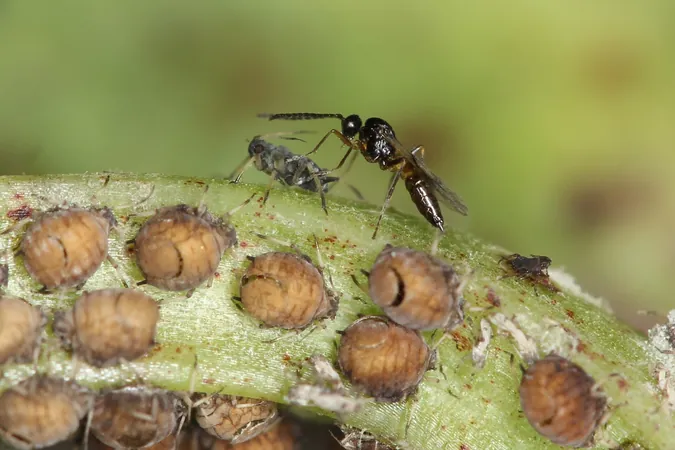
Revolutionary Wasps: A Dual Reproduction Discovery That Could Transform Pest Control!
2025-06-09
Author: Arjun
Game-Changing Discovery in Pest Control
Scientists have unveiled groundbreaking research on a small yet significant species of wasp, the Lysiphlebus fabarum, which could reshape the landscape of natural pest control. For the first time, it has been discovered that this tiny wasp can reproduce both sexually and asexually, defying long-held beliefs that its asexual females could not mate.
The Natural Enemy of Pests
These remarkable wasps lay their eggs inside aphids—sap-sucking pests that threaten crops—leading to the larvae devouring their hosts from the inside out. With their natural ability to combat aphids, Lysiphlebus fabarum has incredible potential as a biological pest control agent.
The Significance of Sexual Reproduction
While asexual reproduction offers an efficient means to produce large populations of wasps, the discovery that these creatures can also reproduce sexually opens doors to enhancing genetic diversity. This is crucial for developing more resilient pest control agents that can adapt to varied local environments.
Insights from Dr. Rebecca Boulton
Dr. Rebecca Boulton, an esteemed lecturer from the University of Stirling, led this pivotal study. She emphasizes the evolutionary advantages of its dual reproduction strategy, noting that while asexual reproduction is efficient, sexual reproduction is essential for adaptivity in changing environments.
Hidden Costs of Sex?
Interestingly, Dr. Boulton's findings suggest there could be hidden costs associated with facultative sex, potentially reducing the reproductive success of female wasps and raising questions about how often this behavior occurs in nature.
Innovative Experimental Approach
Dr. Boulton's research methodology was equally innovative. Initially planning to compare the parasitizing abilities of asexual and sexual wasps, she unexpectedly observed mating behavior in asexual females. This prompted her to evolve her experimental approach, leading to comprehensive paternity testing that confirmed the offspring of mated asexual females carried genetic material from males.
Publishing Groundbreaking Results
This compelling research, titled "Is facultative sex the best of both worlds in the parasitoid wasp Lysiphlebus fabarum?" has been published in the prestigious Royal Society Open Science. Experts like Professor Anne Ferguson-Smith are thrilled at the implications for sustainable pest control, highlighting how such foundational research can lead to real-world environmental benefits.
A Bright Future for Natural Pest Control
As this study unfolds, it holds promise for developing new biocontrol strategies, harnessing the natural reproductive behavior of these wasps to effectively combat aphid populations worldwide. With the potential to revolutionize pest management practices, Dr. Boulton’s findings are a beacon of hope for ecological pest solutions.


 Brasil (PT)
Brasil (PT)
 Canada (EN)
Canada (EN)
 Chile (ES)
Chile (ES)
 Česko (CS)
Česko (CS)
 대한민국 (KO)
대한민국 (KO)
 España (ES)
España (ES)
 France (FR)
France (FR)
 Hong Kong (EN)
Hong Kong (EN)
 Italia (IT)
Italia (IT)
 日本 (JA)
日本 (JA)
 Magyarország (HU)
Magyarország (HU)
 Norge (NO)
Norge (NO)
 Polska (PL)
Polska (PL)
 Schweiz (DE)
Schweiz (DE)
 Singapore (EN)
Singapore (EN)
 Sverige (SV)
Sverige (SV)
 Suomi (FI)
Suomi (FI)
 Türkiye (TR)
Türkiye (TR)
 الإمارات العربية المتحدة (AR)
الإمارات العربية المتحدة (AR)